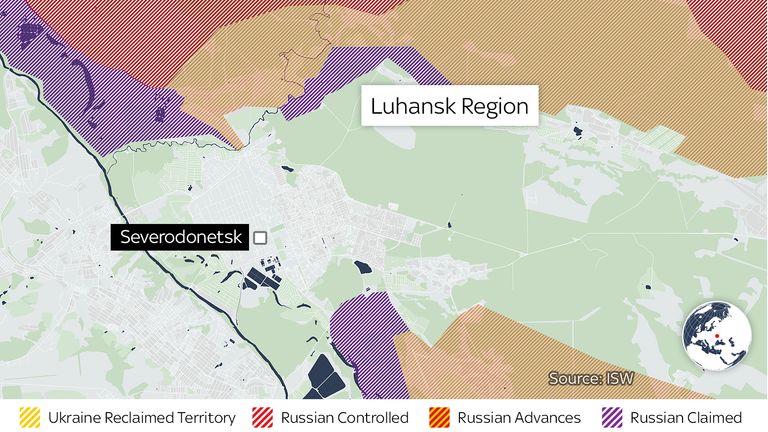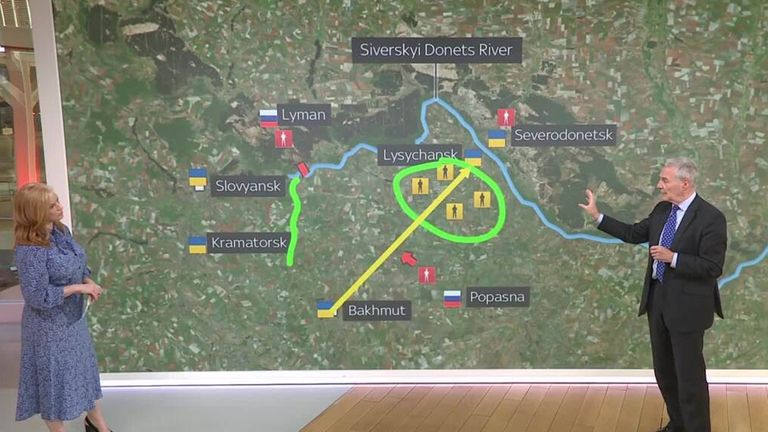[ad_1]
Russian troops now control “around half” of the Ukrainian city of Severodonetsk, an official has said, with British intelligence warning “gains are being held”.
Ukrainian soldiers are fighting to retain control of the strategic city, but the evacuation of civilians is not currently possible, Oleksandr Stryuk, the head of the city’s administration, added.
“The city is still in Ukrainian hands, and it’s putting up a fight… (but) evacuations are not possible due to the fighting,” he told Ukrainian television.
Battle rages in key city for Russia – live Ukraine updates
Russia is focusing on “liberating” the eastern Donbas region as part of its “special military operation” after facing stiff Ukrainian resistance in the north.
Russian-backed separatists control part of the Luhansk and Donetsk regions which jointly make up the Donbas, and Vladimir Putin wants it entirely in pro-Russian hands.
Giving an update from a pocket of resistance that has held back the broader Russian offensive in the Donbas, Serhiy Haidai, the governor of Luhansk, told Ukrainian state television there were around 15,000 civilians left in Severodonetsk.
Reporting from the city, Sky’s Alex Crawford found tensions running high among those who chose to stay, with most of its 120,000 people having fled the brutal bombardment by Russian artillery.
Mr Haidai said Ukrainian troops defending Severodonetsk could retreat across the Siverskyi Donets river to the city of Lysychansk to escape encirclement.
Moscow’s main objective likely remains the encirclement of Severodonetsk and the closure of the pocket around Ukrainian forces in Luhansk Oblast, said the UK Ministry of Defence (MoD).
“Heavy shelling continues, while street fighting is likely taking place on the outskirts of Severodonetsk,” it said in its latest Twitter update.
Russian gains ‘are being held’
“Progress has been slow but gains are being held,” the MoD added.
“Routes into the pocket likely remain under Ukrainian control. Russia has achieved greater local successes than earlier in the campaign by massing forces and fires in a relatively small area. This forces Russia to accept risk elsewhere in occupied territory.”
It said: “Russia’s political goal is likely to occupy the full territory of Donetsk and Luhansk Oblasts.
“To achieve this, Russia will need to secure further challenging operational objectives beyond Severodonetsk, including the key city of Kramatorsk and the M04 Dnipro-Donetsk main road.”
Sky’s Alistair Bunkall, who is in the Ukrainian capital Kyiv, said the “street-by-street” battle for Severodonetsk could be heading into its final hours and days.
“If Russian forces successfully capture the city, and that’s looking likely, they will be able to claim control of the entire Luhansk region – their biggest victory in the three-month conflict to date.”
Other key developments:
• A Ukrainian teacher who spent 65 days sheltering underground with her six-month-old baby in the besieged Azovstal steelworks has spoken of life in the last outpost of Ukrainian resistance in Mariupol
• Russia’s defence ministry says its forces have downed a Ukrainian Su-25 fighter jet in Ukraine’s Mykolaiv region and bombed a radar station and two ammunition depots in eastern Ukraine
• A ship has left a port in the besieged city of Mariupol for the first time since Kremlin forces captured the region and is heading east to Russia, Interfax news agency reports, citing the Russian-backed separatist leader of the Ukrainian breakaway region of Donetsk
• Belarus will conduct military mobilisation exercises in June and July near the Ukrainian border, according to state news agency BelTA
Subscribe to the Ukraine War Diaries on Apple Podcasts, Google Podcasts, Spotify and Spreaker
The battle for the Donbas continued as the EU agreed to ban around 75% of Russian oil imports.
The embargo covers Russian oil brought in by sea, but has a temporary exception for imports delivered by pipeline to appease Hungary and other countries concerned about the economic impact of a full ban.
Hungary gets more than 60% of its oil from Russia and relies on crude that comes from the Soviet-era Druzhba (“Friendship”) pipeline.
[ad_2]



